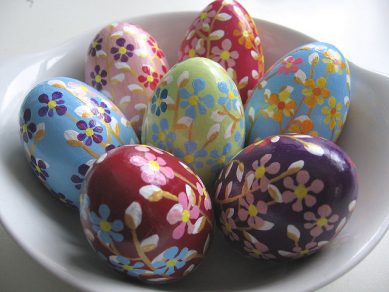Easter Sunday, a significant day in Christianity, celebrates the resurrection of Jesus Christ after his crucifixion on Good Friday. It is marked by various traditions and customs worldwide.
Religious Observances
- Holy Week: Begins on Palm Sunday, marking Jesus’ entry into Jerusalem, and ends on Easter Sunday. Various events from Jesus’ life are commemorated during this week.
- Lent: Preceding Easter, a 40-day period of fasting, prayer, and penance, mirroring Jesus’ 40 days of fasting in the desert.
Symbolism and Traditions
- Easter Eggs: Symbolize fertility and birth. Historically, eggs were decorated to mark Holy Week, a practice stemming from the Christian prohibition on consuming meat and eggs during this period.
- Easter Bunny: Associated with the delivery of Easter eggs to children. Originated from German folklore and later popularized in the US and England.
- Chocolate: Introduced to Europe in the 17th century, chocolate became a prominent Easter treat by the 20th century.
Evolution of Easter Customs
- Decorated Eggs: Believed to have originated around the 13th century, with natural dyes and later with chocolate.
- Egg Hunts: Traced back to the 16th century, symbolizing the empty tomb of Christ after resurrection.
- Rabbits: Associated with fertility and springtime, contributing to Easter imagery.
Historical Influences
- Cultural Exchange: Various cultural and historical influences have shaped Easter traditions, from ancient Pagan symbolism to medieval royal practices.
Multiple-Choice Questions (MCQs):
- What event marks the beginning of Holy Week?
- A) Easter Sunday
- B) Good Friday
- C) Palm Sunday
- D) Lent
- Answer: C) Palm Sunday
- Why were eggs decorated during Holy Week in medieval times?
- A) To commemorate Jesus’ resurrection
- B) To symbolize fertility and birth
- C) Because meat and eggs could not be consumed
- D) As a tradition borrowed from Pagan rituals
- Answer: C) Because meat and eggs could not be consumed
- Who popularized the tradition of the Easter Bunny in England?
- A) King Edward I
- B) Queen Victoria
- C) Martin Luther
- D) King Charles II
- Answer: B) Queen Victoria
- Which century saw the introduction of chocolate to Europe?
- A) 13th century
- B) 16th century
- C) 17th century
- D) 20th century
- Answer: C) 17th century
- What is the significance of egg hunts during Easter?
- A) Symbolize Jesus’ resurrection
- B) Represent fertility and birth
- C) Reenact the empty tomb of Christ
- D) Commemorate Jesus’ fasting in the desert
- Answer: C) Reenact the empty tomb of Christ
